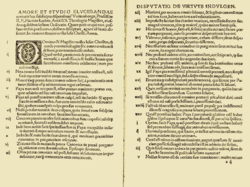
Back إصلاحية راديكالية Arabic Reforma radical Catalan Dědicové radikální reformace Czech Radikale Reformation German Ριζοσπαστική Μεταρρύθμιση Greek Radikala Reformacio Esperanto Reforma radical Spanish Réforme radicale French Radikális reformáció Hungarian Reformation radical Interlingua
| Part of a series on the |
| Reformation |
|---|
 |
| Protestantism |
| Part of a series on |
| Christianity |
|---|
 |
| Part of a series on |
| Anabaptism |
|---|
 |
|
|
The Radical Reformation represented a response to perceived corruption both in the Catholic Church and in the expanding Magisterial Protestant movement led by Martin Luther and many others. Beginning in Germany and Switzerland in the 16th century, the Radical Reformation gave birth to many radical Protestant groups throughout Europe. The term covers Radical Reformers like Thomas Müntzer and Andreas Karlstadt, the Zwickau prophets, and Anabaptist groups like the Hutterites and the Mennonites.
In Germany, Switzerland and Austria, a majority sympathized with the Radical Reformation despite intense persecution.[1] Although the surviving proportion of the European population that rebelled against Catholic, Lutheran and Reformed Churches was small, Radical Reformers wrote profusely, and the literature on the Radical Reformation is disproportionately large, partly as a result of the proliferation of the Radical Reformation teachings in the United States.[2][page needed]
- ^ Horsch, John (1995). Mennonites in Europe. Herald Press. p. 299. ISBN 978-0836113952.
- ^ Euan Cameron (2012). The European Reformation (2nd ed.). New York: Oxford University Press. ISBN 978-0-19-873093-4.